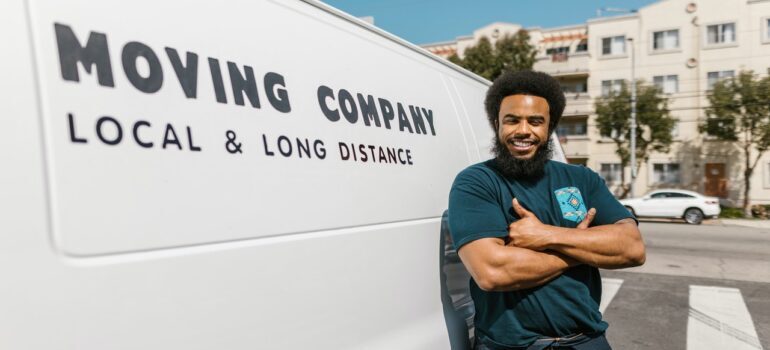If you need to move, and you’re not really into the idea of doing it yourself, you’re likely in need of movers. However, there are countless stories out there about subpar moving services or outright moving scams. That, in itself, can be very scary and worrying. Who wants to be stuck with incompetent movers on one of the most stressful days of their life? Or even worse, who wants to be charged an obscene amount of money for a very simple service? Likely no one. At Verified Movers, our whole job is making sure that our customers are safe and happy with the service they get. But, if you have no one to help, you have to educate yourself on telltale signs of fraudulent relocation companies. But fear not, fellow citizen, for we have come to the rescue. Today we’ll teach you all about the signs of fraudulent movers and how to recognize them.
Strange, they just seem to have fallen off of the face of the Earth…
Have you ever tried to google a business without any success? If you have, then you surely know how frustrating that can be. After all, isn’t everything on Google nowadays? It must be your fault somehow because Google is the end-all-and-be-all of all information available to humans. Library of Alexandria who? However, all jokes aside, even though you can find pretty much all legitimate businesses on the internet, finding scammers can be pretty hard. Some of them can even be hard to trace in real life. But how and why do these businesses hide and what tactics do they use to evade punishment for their wrongdoings? Let’s find out.

If you can’t find any relevant information about the company, you might be dealing with one of the fraudulent relocation companies!
Fraudulent relocation companies often do not have an internet presence
We’re living in an age of technology and you know that knowledge is accessible more than ever before. Everyone has a presence on the internet – a “digital footprint”, so to speak. This, of course, applies to companies, too, and, yes, that includes relocation companies, like long distance moving companies New York prides itself in, for example. Fraudulent companies, however, do not have an internet presence. This means that they want to reduce their “digital footprint”. This is for the exact same reason why criminals want to conceal their traces. Information on them makes it likely that the authorities will catch them and bring them to justice. So, to sum it up, if they don’t have a website, it’s a definite red flag.
Fakery is also a thing when it comes to fraudulent relocation companies
Receiving sketchy and untruthful information is a real problem when dealing with scammers. And for your average Joe, that’s never moved before, knowing said info is fake can be, we dare to say, even impossible sometimes. That’s mostly because these “movers” are pro scammers. Instead of learning how to move, they are learning how to scam. Given how much time and energy they’re investing in seeming legit, they might as well try to develop a real business with trained employees.
Luckily, there are ways to get better at recognizing fake info. Being vigilant, asking more experienced people for help, background checking, and staying skeptical are all legitimate ways of making sure that movers aren’t trying to pull a sneaky on you. Also, keep in mind that no legitimate long distance movers Idaho residents praise for their reliability, for example, would ever seem sketchy. If it looks like a duck, swims like a duck, and quacks like a duck, then, well, it probably is a duck

It’s advisable to talk to someone with more moving experience than you if you suspect you’re getting scammed!
No address should be an immediate red flag
There are some legitimate and certified moving businesses that don’t have physical addresses you can visit them at. However, these businesses are very few and far between. Most legitimate moving companies will have a physical address. And if they don’t they’ll make sure to let you know why that is, as well as make it up to you in other ways. Meaning, making things very simple and easy, and of course, making themselves easily reachable. That said, scam movers are notorious for not having actual addresses. Without an address, they’re not as liable as they would be with an address. It’s much easier to delete your website than deleting official documents about the company registry at a particular place. So if there’s no address it’s time to start asking questions!
Legalities are optional rather than given when dealing with fraudulent moving businesses
Scam movers are obviously not the best at adhering to rules, regulations, and laws. They usually play things by the ear, improvising, and adapting to get every last penny out of you if possible. A company trying to circumvent any legalities is one of the best indicators that something is off. Workarounds are not a thing when dealing with expert long distance moving companies California, or any other state for that matter has to offer, and you should keep that in mind.
There is a place for some legalities when dealing with fraudulent relocation companies, though
That’s right, the only time scammers concern themselves with legalities is when they’re trying to “legally” scam you. Fraudulent moving companies may offer you pages upon pages of contracts. These contracts are filled with “doublespeak”, and they will be trying to impose on you a veneer of professionalism. This means, in short, that fraudulent relocation companies will, by and large, attempt to lure you into signing a document. And you know that, once you sign it, it’s game over – once you sign the document, the court has no choice but to rule in the company’s favor. So, how can you tell that the legally binding contract is suspicious? All of them have some common elements:
- They’re much longer than needed. This is mostly to deter you from reading the whole thing. Also, they are trying to make themselves seem more legitimate by having long contracts.
- Some of the clauses are full of overly complex, unnecessary words. If you aren’t sure what the contact means (how it translates into reality), do not sign it;
- It’s full of phrases such as “other fees may apply”. Note the word “may”. It’s there to make you think that they will not apply, but, as we all know, they will.

Never sign a contract without thoroughly reading it first!
Loading first, price negotiation second
Whoa there. Don’t even let them touch your stuff if you haven’t signed a contract first. Estimation doesn’t require physical touch! And if they’re trying to convince you that it dies, run! It’s best to first read FMCSA’s pamphlet about your moving right and responsibilities. That way you’ll be a lot better informed on the matter thus making your move safer. If they tell you they need to load your goods before they can give you the price, they may attempt to hold your goods for ransom. Don’t be shocked, it’s happened before. They will do this by loading the truck, then setting a staggeringly high price. If that happens, you’re in quite some trouble. So, to avoid getting into said trouble, here’s exactly what information the moving company representative should give to you before picking up your boxes:
- A written (and signed) estimate of the value of the service they provide;
- FMCSA’s “Ready to move” brochure;
- Information about the arbitration program (some problems can be solved without going to court, and they can happen, even with legitimate moving companies);
- Written notice about mover’s tariff access;
- Claims handling the process.
Nothing is ever as good as it should be
What you’ll likely notice with fraudulent movers is that seem never seem that great. Sure, things may not be as bad as to immediately think something fishy is going on. However, things likely won’t be nearly as smooth as they’d be with top-class long distance movers Kansas locals wholeheartedly recommend. Unfortunately, if this is your first time moving, you might think that that’s just what moving is like. Beat up equipment? Must be because they’ve used it a lot. Rude employees? Must be that they’re tired and overworked. Weird contracts and practices? Eh, must be just how they do things around here. However, none of that is good or “normal”. So if you notice that things are falling apart, you should look for new movers.

Legit movers will almost always have their own moving vans or trucks!
Fraudulent moving companies possess little to no equipment of their own
They seem legitimate to you, and you’ve decided to let them come to your house to determine prices, contract obligations, etc. Then they appear in a run-down truck that has obviously seen much better days. You’re not sure the truck can survive the trip. On the side of the storage compartment, there’s a company name and logo… However, those two belong to a truck rental company. You need to move several hundred miles, and you’re not sure the truck can survive the trip. You ask the employees about the occasion and they say one of the following excuses:
- The truck is theirs, it just needs a repainting;
- All of their trucks are either busy or broken, and they’ve rented a truck just for you – this is a lie and you know it. It’s best to ask them to leave and call the police if they say no;
- They ask why it even matters.
At that point, it’s time to say no. You’re dealing with a fraudulent moving company. And, just for the sake of fellow customers, be sure to report them.
The employees don’t seem to know what they’re doing
Aside from weird or rundown equipment that doesn’t belong to them, you might also notice that the employees are not really acting… right. They might seem clueless, confused, or even rude. If you notice that the movers are doing any of this, it’s best to stop the moving process:
- Avoiding answering your questions
- Answering your questions incorrectly
- Getting angry at you for asking questions
- Being agitated
- Trying to finish up quickly to leave as soon as possible
- Making mistakes left, right, and center

With fraudulent relocation companies dealing with all of the mess often falls on you!
If you notice one or more of these it’s better to reconsider hiring another company. Of course, just because one employee is not doing the best job, that doesn’t necessarily mean that the business is illegitimate. However, it’s better to be safe than sorry. If you spot one of these, it’s best to try and be as observant as possible and keep an eye out for other red flags.
Keeping yourself safe is your job…
As we mentioned, fraudulent relocation companies sometimes do not have an internet presence. This doesn’t mean that all of them are “offline”, so to speak. There may well be fraudulent moving companies with a website. And now, you have to trace their digital footprint for traces of bad business practices. The first thing you should do is to check if they are registered with the Federal Motor Carrier Safety Administration (the FMCSA). If they aren’t that’s a big red flag. Also, make sure to check out the rating. You should also not skip on reading the reviews themselves, especially the long and in-depth ones.
Another place you should visit is the Better Business Bureau (BBB). BBB is a nonprofit organization that helps you find out more about a specific business. When it comes to identifying fraudulent moving companies or simply moving companies with bad business practices, it’s the place to go. The other and much easier option here is to simply reach out to our moving company match-up option – the safest way to avoid fraudulent relocation companies all around the country.

Getting in touch with tried and tested business that matches clients with true moving experts is the best way to avoid moving scams!
Knowing signs of fraudulent movers can save you a lot of trouble
Dealing with fraudulent movers can completely destroy a person’s moving experience. Just imagine all of the stress someone would feel realizing their belongings are being held hostage. However, protecting yourself against fraudulent relocation companies is luckily possible. But, knowing what to do and when to do it, when dealing with movers, requires educating yourself. Because of that, we strongly advise you to spend some time educating yourself on moving and moving-related laws and practices, before you begin your moving venture. Good luck and keep your eyes wide open!




